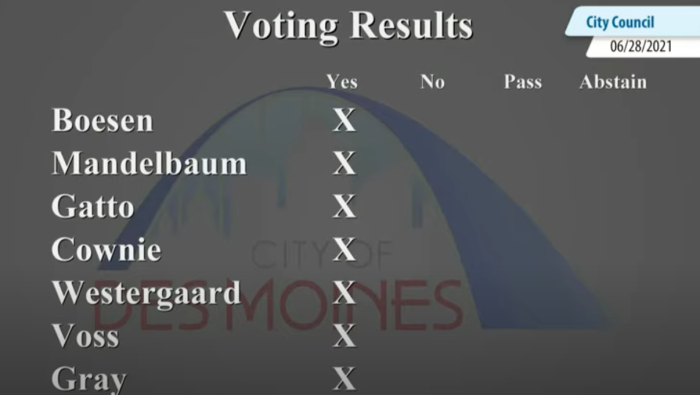Brandi Webber is a local artist, volunteer, mother, and candidate for Des Moines City Council in Ward 3. -promoted by Laura Belin
Gross abuse of power.
Those are words you won’t read in any newspaper, local tv, or online news article about the Des Moines City Council meeting on June 28 – or any council meeting, for that matter. However, that is exactly what has been happening for more than a year.
The consent agenda, by definition, is for day to day city business. In other words, non-controversial agenda items – liquor licenses and things of that nature. If there were something disagreeable on the consent agenda, normally the public could address the council at the meeting to have the item pulled.
But the Des Moines City Council unanimously voted on June 28 to take that opportunity away from the public. Residents of our city no longer have the right to address the council in person regarding consent agenda items, ensuring that the broader public will not be made aware of problematic items in time to speak against them.
Before voting to further silence the residents of Des Moines, the council was routinely preventing certain people, most often those from the BIPOC and LBGTQ+ communities, from speaking out against problematic consent agenda items. By calling their comments “non-germane” and not letting them continue, saying their language was “disruptive” and not letting them continue, or simply putting them on mute during Zoom meetings, the council has been oppressing the voices of our community for over a year.
In previous meetings, when a person from the public would request an item be pulled for discussion, it was common that not one elected official on that council stood up to be a voice for that person, unless the person represented a corporation or business interest. On June 28, the public was again calling for a controversial item to be pulled from the consent agenda for further discussion: a plan to have the national Police Executive Research Forum conduct de-escalation training for the Des Moines Police Department.
Since the council had voted moments before against allowing the public to have input on the consent agenda, those residents were labeled “disruptive,” were led out of the meeting, and denied re-entry. Council members then approved the contract paying PERF $148,000 to train Des Moines officers. Later in the meeting, they approved an exception to the city’s competitive bidding ordinance to allow the contract to be awarded. Why was a no-bid contract part of the consent agenda in the first place, and why were members of the public denied a chance to object?
There are several ways the council could give Des Moines residents a chance to speak outside of the city council meetings. They could start by doing the bare minimum and make themselves accessible to the public for meetings and town halls.
You see, the very same residents being labeled “disruptive” have been trying to contact council members for more than a year to discuss their legitimate concerns. In return, they’ve heard empty promises for town halls that never happen, or no response at all.
These elected officials sit silently behind their wall of power, passing more restrictive rules on public input and denying residents their constitutional right to speak out against actions they deem corrupt. If members of the public try to have their voices heard, they can be and have been removed and arrested. That doesn’t sound like a democracy to me.
Our current council is grossly abusing their power by using the consent agenda to pass items they know to be controversial, and silencing anyone who speaks against them. I am – and will always be – an advocate for free speech. By definition, the First Amendment gives residents of our country the right to articulate their opinions and ideas without fear of retaliation, censorship, or legal sanction.
As the candidate for the Des Moines City Council Ward 3 seat, I will always fight for your right to speak, even if we disagree. That is the role of elected officials in our country, to represent the interests and voices of their constituents.
You can follow Brandi Webber on Facebook, Twitter, Instagram, and TikTok.

